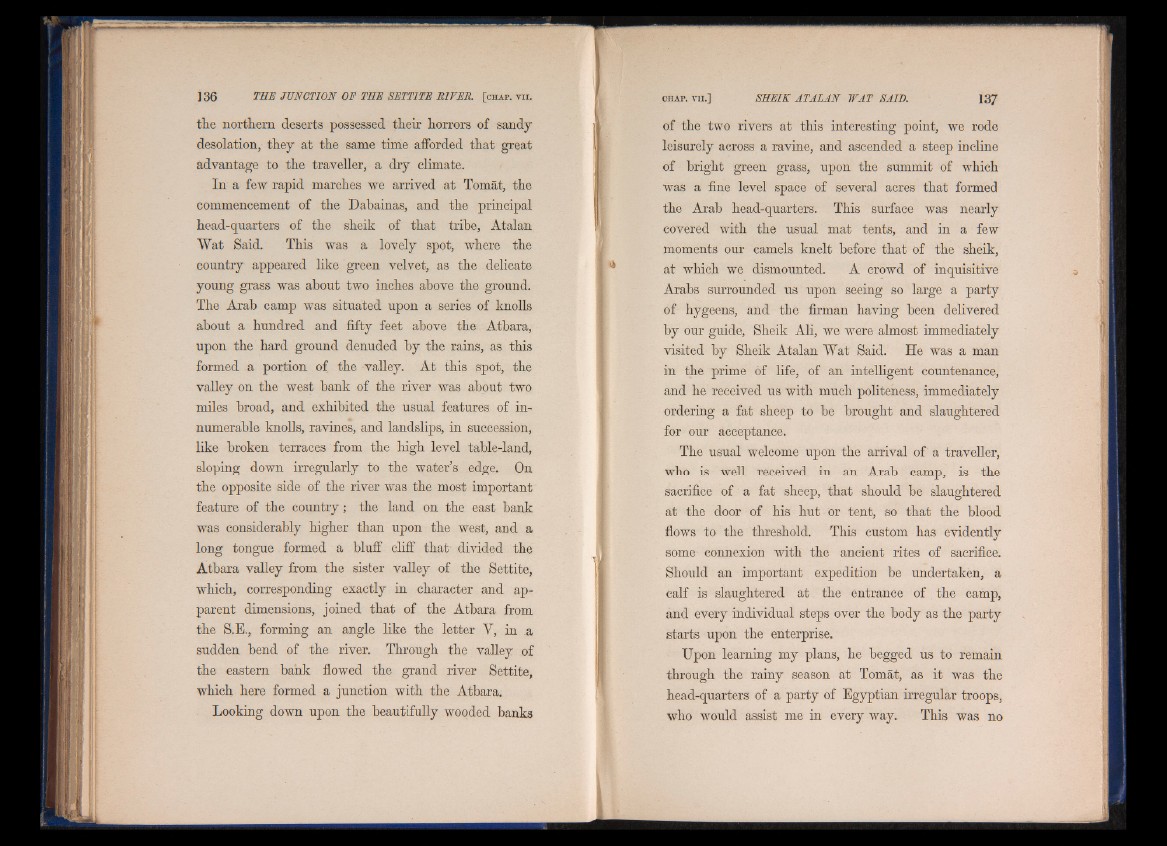
the northern deserts possessed their horrors of sandy
desolation, they at the same time afforded that great
advantage to the traveller, a dry climate.
In a few rapid marches we arrived at Tomat, the
commencement of the Dabainas, and the principal
head-quarters of the sheik of that tribe, Atalan
Wat Said. This was a lovely spot, where the
country appeared like green velvet, as the delicate
young grass was about two inches above the ground.
The Arab camp was situated upon a series of knolls
about a hundred and fifty feet above the Atbara,
upon the hard ground denuded by the rains, as this
formed a portion of the -valley. At this spot, the
valley on the west bank of the river was about two
miles broad, and exhibited the usual features of innumerable
knolls, ravines, and landslips, in succession,
like broken terraces from the high level table-land,
sloping down irregularly to the water’s edge. On
the opposite side of the river was the most important
feature of the country; the land on the east bank
was considerably higher than upon the west, and a
long tongue formed a bluff cliff that divided the
Atbara valley from the sister valley of the Settite,
which, corresponding exactly in character and apparent
dimensions, joined that of the Atbara from
the S.E., forming an angle like the letter Y, in a
sudden bend of the river. Through the valley of
the eastern bank flowed the grand river Settite,
which here formed a junction with the Atbara.
Looking down upon the beautifully wooded banks
of the two rivers at this interesting point, we rode
leisurely across a ravine, and ascended a steep incline
of bright green grass, upon the summit of which
was a fine level space of several acres that formed
the Arab head-quarters. This surface was nearly
covered with the usual mat tents, and in a few
moments our camels knelt before that of the sheik,
at which we dismounted. A crowd of inquisitive
Arabs surrounded us upon seeing so large a party
of hygeens, and the firman having been delivered
by our guide, Sheik Ali, we were almost immediately
visited by Sheik Atalan Wat Said. He was a man
in the prime of life, of an intelligent countenance,
and he received us with much politeness, immediately
ordering a fat sheep to be brought and slaughtered
for our acceptance.
The usual welcome upon the arrival of a traveller,
who is well received in an Arab camp, is the
sacrifice of a fat sheep, that should be slaughtered
at the door of his hut or tent, so that the blood
flows to the threshold. This custom has evidentlv«/ some connexion with the ancient rites of sacrifice.
Should an important expedition be undertaken, a
calf is slaughtered at the entrance of the camp,
and every individual steps over the body as the party
starts upon the enterprise.
Upon learning my plans, he begged us to remain
through the rainy season at Tomat, as it was the
head-quarters of a party of Egyptian irregular troops,
who would assist me in every way. This was no